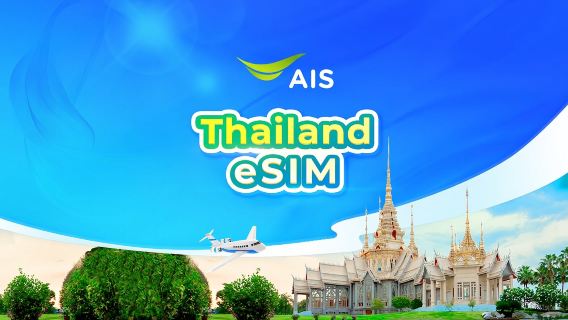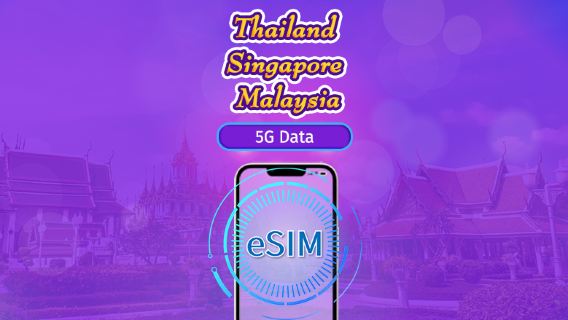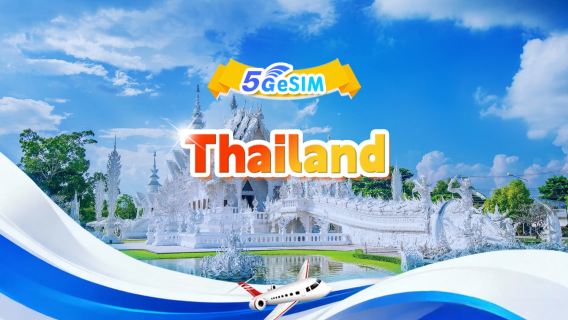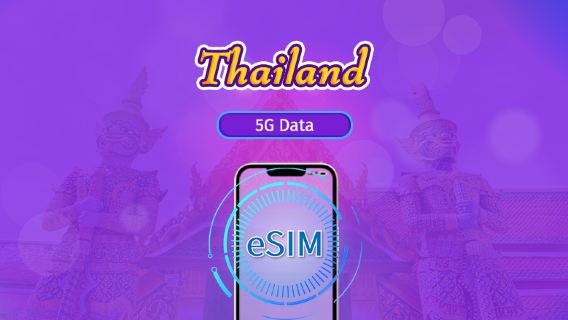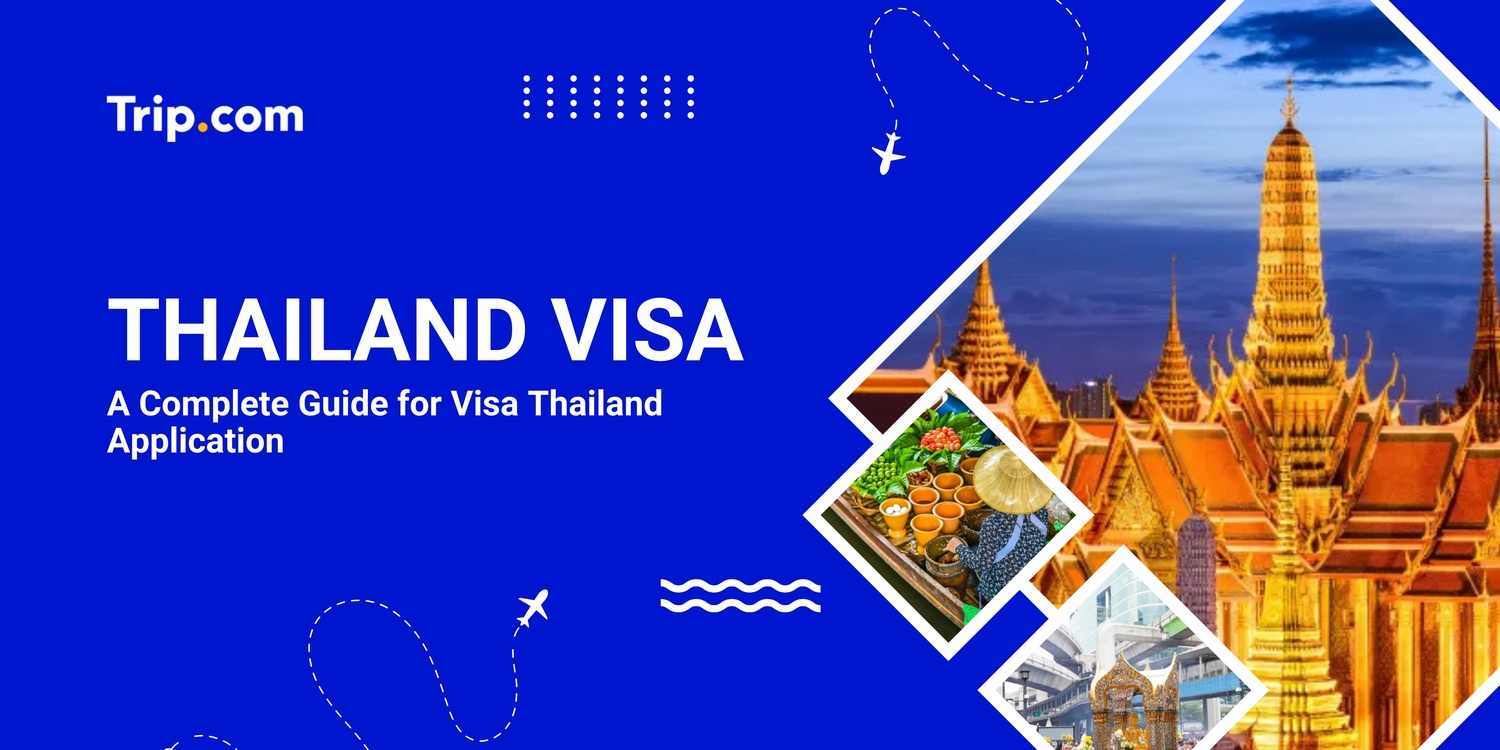
Thailand offers an abundance of experiences for all types of travelers. From the gleaming skyscrapers of Bangkok to the golden temples of Chiang Mai, the country is a mix of modernity and ancient traditions. The vibrant nightlife and bustling markets of Bangkok offer an exciting city experience, while the tranquil beaches of Phuket and Krabi provide the perfect escape for relaxation and water activities. Visitors can indulge in delicious street food, immerse themselves in cultural festivals, explore serene temples, and discover Thailand’s rich history. Whether you're here for a holiday, business trip, or an extended stay, make sure to explore the visa options available before you travel.
What is a Thailand Visa?
A Thailand visa is an official authorization issued by the Thai government, typically in the form of a stamp or endorsement on a passport or other travel documents. It grants foreign nationals, including Singaporeans, permission to enter, exit, or transit through Thailand.
This article will explore the different types of Thailand visas, the application process, associated fees, processing times, and other important details to help you prepare for your visit to the Land of Smiles.
Types of Thailand Visa
1. Tourist Visas
Tourist Visa (TR)
For individuals visiting Thailand for tourism purposes.
- Requirements: Proof of financial stability and a return ticket.
Special Tourist Visa (STV)
Introduced to attract long-term tourists.
- Requirements: Must show financial stability and provide details about your stay in Thailand.
2. Non-Immigrant Visas
These visas are for individuals engaging in activities such as business, employment, or education in Thailand.
Non-Immigrant B Visa (Business)
For individuals intending to work, conduct business, or invest in Thailand.
- Requirements: Letter of invitation from a Thai company, work permit (for employment), or proof of investment (for business owners).
- Subcategories:
- Business Visa (B)
- Intra-company Transferee
- Work Visa for Skilled Labor
Non-Immigrant ED Visa (Education)
For students wishing to study in Thailand.
- Requirements: Enrollment in a Thai educational institution and sufficient financial means to support your stay.
Non-Immigrant O Visa (Other)
For various non-work-related activities, such as retirement, volunteering, or accompanying a spouse or child.
- Requirements: Proof of relationship for accompanying family members, or retirement eligibility (age 50 or older for retirees).
- Non-Immigrant O-A (Long Stay) for retirees.
3. Work Visas
Non-Immigrant B Visa (Business)
For individuals working in Thailand or managing a business.
- Requirements: Employment contract or business registration documents.
Work Permits
Necessary for foreign nationals who want to engage in paid employment in Thailand.
- Typically issued after obtaining a Non-Immigrant B Visa.
- Requires sponsorship by a Thai employer.
4. Transit Visa
Transit Visa (TS)
For individuals traveling through Thailand on their way to another country.
- Requirements: Proof of onward travel (e.g., flight ticket to another country).
5. Family-Related Visas
Spouse or Child of Thai National
For foreign nationals married to Thai citizens or their children.
- Requirements: Proof of marriage or parent-child relationship with a Thai citizen.
Dependent Visa
For spouses and children of foreign nationals who hold work permits in Thailand.
- Requirements: Proof of relationship and financial support.
6. Permanent Resident Visa
Permanent Resident Visa
For foreign nationals who have lived in Thailand for a set number of years (usually 3–5 years).
- Requirements: Must meet criteria based on professional skills, investment in Thailand, or family connections.
7. Retirement Visas
Non-Immigrant O-A Visa (Long Stay)
For retirees aged 50 or older who wish to stay in Thailand long-term.
- Requirements: Proof of financial stability (minimum monthly income or bank deposit requirement), health insurance, and no criminal record.
8. Special Visas
Elite Visa
For individuals wishing to invest in Thailand or enjoy long-term privileges like expedited immigration procedures and visa-free entry.
- Requirements: High financial investment or membership in Thailand's Elite Visa Program.
Visa-Free Countries and Regions for Thailand
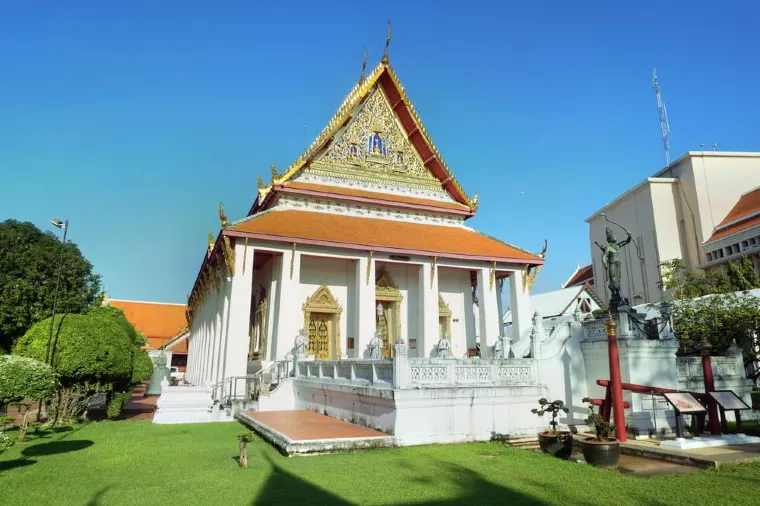
| Region | Country/Region | Visa-Free Duration |
|---|---|---|
Asia | Malaysia | 30 days |
South Korea | 90 days | |
Philippines | 21 days | |
Singapore | 30 days | |
Indonesia | 30 days | |
Japan | 90 days | |
Jordan | 90 days | |
Kuwait | 90 days | |
Kyrgyzstan | 90 days | |
Maldives | Visa on arrival for 30 days | |
Nepal | Visa on arrival for 15–60 days | |
Cambodia | 30 days | |
Brunei | 30 days | |
Hong Kong | 90 days | |
Macau | 30 days | |
Taiwan | 30 days | |
Europe | United Kingdom | 180 days |
Switzerland | 90 days | |
Sweden | 90 days | |
Malta | 90 days | |
Finland | 90 days | |
Norway | 90 days | |
Germany | 90 days | |
France | 90 days | |
Netherlands | 90 days | |
Belgium | 90 days | |
Denmark | 90 days | |
Iceland | 90 days | |
Ireland | 90 days | |
Italy | 90 days | |
Spain | 90 days | |
Portugal | 90 days | |
Greece | 90 days | |
Hungary | 90 days | |
Czech Republic | 90 days | |
Slovakia | 90 days | |
Slovenia | 90 days | |
Poland | 90 days | |
Romania | 90 days | |
Croatia | 90 days | |
Estonia | 90 days | |
Latvia | 90 days | |
Lithuania | 90 days | |
Liechtenstein | 90 days | |
Luxembourg | 90 days | |
San Marino | 90 days | |
Americas | United States | 30 days (Guam and Northern Mariana Islands) |
Canada | 90 days | |
Mexico | 30 days | |
Brazil | 90 days | |
Argentina | 90 days | |
Chile | 90 days | |
Panama | 30 days | |
Oceania | Australia | 90 days |
New Zealand | 90 days | |
Fiji | 120 days | |
Vanuatu | 90 days | |
Samoa | 30 days | |
Africa | South Africa | 90 days |
Mauritius | 90 days | |
Seychelles | 30 days | |
Botswana | 90 days | |
Tanzania | 90 days |
Validity and Duration of Stay for Thailand Visa
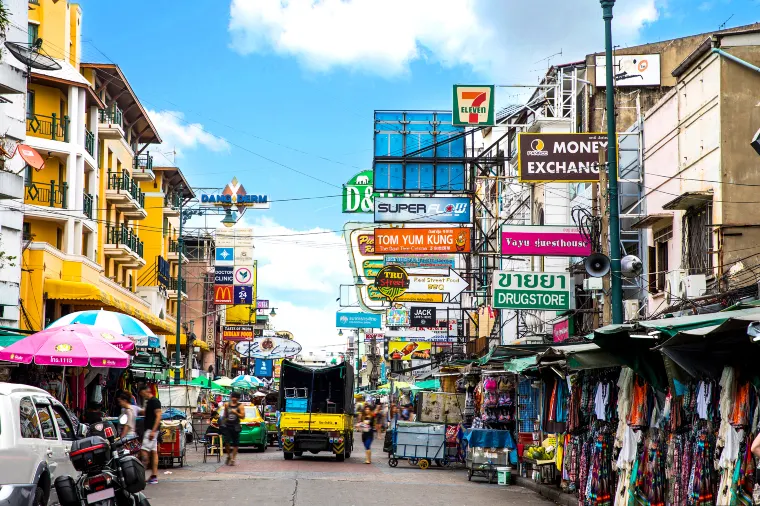
1. Tourist Visas
Tourist Visa (TR)
The validity and duration of stay typically depend on the specific visa issued. Generally, tourist visas are valid for single or multiple entries, with the option to extend for an additional 30 days while in Thailand.
Special Tourist Visa (STV)
This visa allows long-term stays, subject to extensions. The visa can be issued for a stay of up to 90 days at a time, with the possibility of extending up to 270 days in total, depending on specific conditions.
2. Non-Immigrant Visas
These visas are for those engaged in business, education, or other non-tourist activities:
Non-Immigrant B Visa (Business)
Validity is typically for 90 days, but it may be extended depending on the type of business activity or work in Thailand. Extensions may be granted on a case-by-case basis.
Non-Immigrant ED Visa (Education)
Generally, the validity corresponds to the duration of the student’s course. Students may extend their visa as long as they remain enrolled in a recognized educational institution in Thailand.
Non-Immigrant O Visa (Other)
The validity period for this visa depends on the specific purpose (retirement, accompanying a Thai spouse, etc.). For example, retirees may be granted a stay of one year, and extensions may be available if eligibility is maintained.
3. Work Visas
Non-Immigrant B Visa (Business)
The validity of a business visa typically lasts for 90 days, after which the applicant must apply for an extension or a new visa. Foreigners working in Thailand will also need a work permit, which must be renewed periodically.
Work Permits
A work permit is typically valid for one year and can be renewed as long as the applicant continues to meet the eligibility requirements. Work permits are tied to specific jobs and employers, so any job change or employer switch requires a new work permit.
4. Transit Visa
Transit Visa (TS)
A transit visa is usually issued for a short duration, typically 30 days, and is meant for those passing through Thailand en route to another destination. Extensions are not typically granted for transit visas.
5. Family-Related Visas
Spouse or Child of Thai National
This visa is typically issued for one year and can be extended as long as the family relationship remains valid and the applicant continues to meet the requirements.
Dependent Visa
This visa is generally valid for the same duration as the primary visa holder’s work permit or visa status. It can be renewed as long as the primary visa holder remains eligible to stay in Thailand.
6. Permanent Resident Visa
Permanent Resident Visa
This visa grants indefinite stay in Thailand. However, it requires a lengthy application process and meeting specific criteria, including a certain number of years of residency and professional skills.
7. Retirement Visas
Non-Immigrant O-A Visa (Long Stay)
The retirement visa is typically valid for one year. It can be extended annually as long as the retiree continues to meet the financial and health requirements set by Thai immigration laws.
8. Special Visas
Elite Visa
This visa is valid for 5 to 20 years, depending on the type of membership purchased. It provides long-term residency and other privileges, such as expedited immigration services.
Get Thailand eSIM Now!
Requirements for Applying for an Thailand Visa
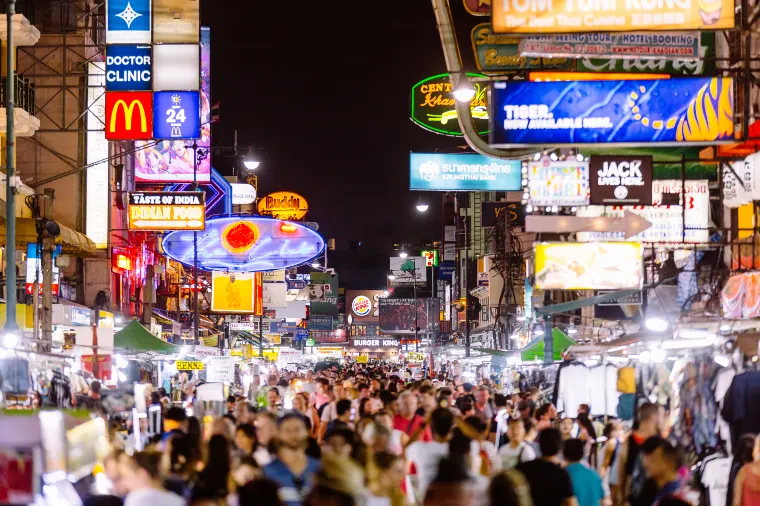
Basic Requirements
- Valid Passport: Applicants must hold a passport that is valid for at least 6 months. This ensures that the passport remains valid for the entire duration of the visa and while staying in Indonesia.
- Completed Application Form: The appropriate visa application form must be filled out accurately and truthfully according to the type of visa being applied for.
Specific Requirements for Different Types of Visas
1. General Visa Requirements
Regardless of the type of visa, there are several common requirements for most Thailand visa applications:
Application Form
A completed visa application form must be submitted. The form can be obtained from the Thai embassy or consulate's website or in person at the consulate.
Passport
Your passport must be valid for at least 6 months from the date of your entry into Thailand, with at least two blank pages.
Photographs
Recent passport-sized photographs (typically 2 pieces) are required. These must meet the embassy's specified size and quality requirements.
Visa Fee
The applicable visa fee must be paid upon application submission. The fee amount varies depending on the type and duration of the visa.
Travel Itinerary
A detailed travel itinerary showing your planned dates of arrival and departure from Thailand. This may include flight bookings or hotel reservations.
2. Tourist Visa Requirements
For those applying for a tourist visa, the following documents are typically required:
Proof of Financial Means
Proof of financial stability, such as recent bank statements (usually the last 3 months), showing enough funds to cover your stay in Thailand.
- Minimum required amount may vary depending on the consulate.
Return Ticket
A return ticket to your home country or a ticket to another destination after your visit to Thailand.
Accommodation Details
Hotel bookings, guesthouse reservations, or an invitation letter from a host in Thailand with their address and contact information.
3. Business Visa (Non-Immigrant B) Requirements
For those applying for a business visa, the following additional documents are required:
Letter of Invitation
A letter of invitation from a Thai company or organization that outlines the purpose of your visit and the duration of stay.
Business Registration Documents
For applicants planning to conduct business or work, documents verifying the business registration of the company in Thailand are required.
Work Permit (if applicable)
If applying for a work visa, a valid work permit may also be necessary to support the application.
4. Education Visa (Non-Immigrant ED) Requirements
For individuals planning to study in Thailand, the following documents are necessary:
Enrollment Confirmation
A letter of acceptance or enrollment confirmation from a recognized educational institution in Thailand.
Proof of Financial Support
Bank statements or a financial guarantee showing that you can cover your tuition and living expenses during your studies.
Health Insurance
Some consulates require applicants to show proof of health insurance coverage during their stay in Thailand.
5. Retirement Visa (Non-Immigrant O-A) Requirements
For those over 50 years old applying for a retirement visa, the following documents are typically required:
Proof of Age
A copy of your passport with your birthdate or other official documentation proving you are over 50 years old.
Financial Requirements
Proof of sufficient income or savings, such as a bank statement or income certificate, meeting the Thai immigration criteria for retirees (e.g., a minimum monthly income or savings amount).
Health Insurance
Some consulates require proof of health insurance that covers medical treatment in Thailand.
6. Family-Related Visa Requirements
For family visas, such as a visa for the spouse or child of a Thai national, the following documents are typically required:
Marriage Certificate or Birth Certificate
A marriage certificate for a spouse or a birth certificate for children, translated into English or Thai, may be required.
Proof of Thai Nationality
For the Thai spouse or parent, a copy of their Thai passport or national ID card may be requested.
7. Permanent Resident Visa Requirements
For those applying for permanent residency in Thailand, applicants typically need to provide:
Long-Term Residency Evidence
Proof of residing in Thailand for a minimum number of years, as determined by immigration authorities.
Professional and Financial Documents
Documents showing that the applicant has stable employment, investment, or professional qualifications to live permanently in Thailand.
Criminal Background Check
A police clearance certificate or background check may be required to prove no criminal record in the applicant's home country.
8. Special Visa Requirements (Elite Visa)
For applicants applying for the Thai Elite Visa, the following is required:
Membership Application
The completed application form for the Elite Visa program.
Proof of Investment
Evidence of financial investment in Thailand or payment for Elite Visa membership.
Personal and Financial Documents
Copies of passport, personal details, and proof of sufficient financial resources for the long-term stay.
Flights to Bangkok
How to Apply for an Thailand Visa
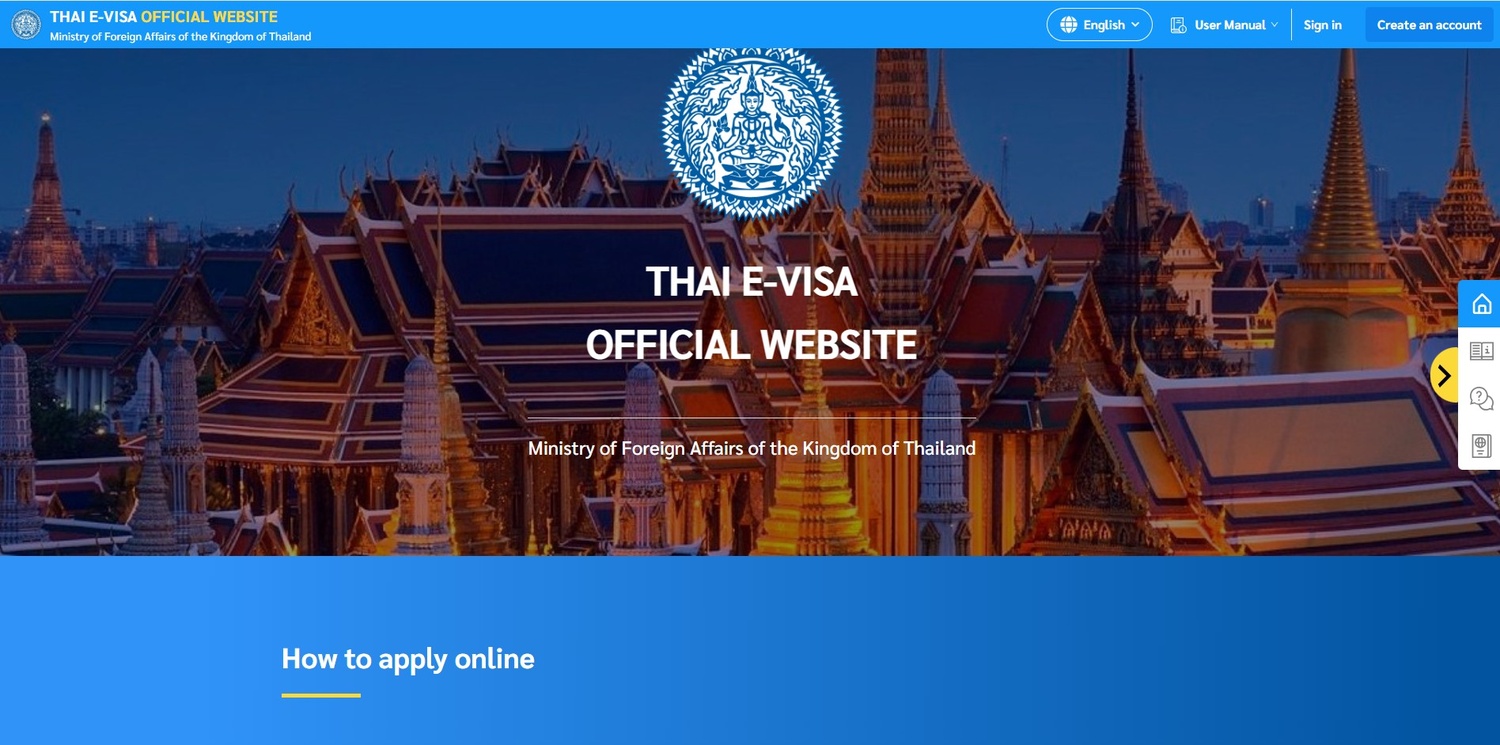
Image From Official Thailand eVisa Website
1. Determine the Type of Visa You Need
Before applying, identify the visa that best suits your purpose of travel. The most common types include:
- Tourist Visa (TR)
- Business Visa (Non-Immigrant B)
- Education Visa (Non-Immigrant ED)
- Retirement Visa (Non-Immigrant O-A)
- Family-Related Visa
- Permanent Resident Visa
- Special Visas (Elite Visa)
Each visa has specific eligibility criteria and required documentation, so it's essential to choose the right one.
2. Prepare the Required Documents
Each visa type has its own set of required documents. Here’s a general list of what you might need:
General Documents for Most Visas:
- Completed Visa Application Form
- Valid Passport (at least 6 months validity)
- Passport-sized Photos (usually 2 photos)
- Visa Fee (check the specific amount for the visa type)
- Proof of Travel (e.g., flight ticket)
- Accommodation Proof (hotel booking or invitation letter)
Additional Documents for Specific Visas:
- Tourist Visa (TR):
- Proof of sufficient funds (bank statements)
- Return ticket
- Business Visa (Non-Immigrant B):
- Letter of invitation from a Thai company or employer
- Company registration documents (if applicable)
- Education Visa (Non-Immigrant ED):
- Enrollment letter from a recognized Thai institution
- Proof of financial means
- Retirement Visa (Non-Immigrant O-A):
- Proof of age (e.g., birth certificate or passport)
- Financial evidence (bank statement or income certificate)
- Health insurance
- Permanent Resident Visa:
- Long-term residency evidence
- Police clearance certificate
- Elite Visa:
- Completed application form for the Elite Visa program
- Proof of financial investment or membership payment
3. Submit Your Application
Apply at a Thai Embassy or Consulate
- Visit the Thai embassy or consulate in your home country or where you legally reside.
- Submit the completed visa application form along with the required documents and visa fee.
Apply Online (If Available)
- Some visa categories may allow you to apply online through the Thai embassy's or consulate’s official website.
- Online applications typically require uploading scanned documents and paying the visa fee online.
4. Pay the Visa Fee
The visa fee varies depending on the visa type and the embassy or consulate processing the application. You can pay the fee by:
- Cash (in person at the embassy or consulate)
- Bank Transfer (some embassies or consulates)
- Credit or Debit Card (for online applications)
Ensure that you have the correct fee amount, as visa applications can be rejected if the payment is incorrect.
5. Wait for Processing
Processing Time
- The processing time for a Thailand visa typically ranges from 2 to 10 business days, depending on the type of visa and the embassy’s workload.
- Some visas may require additional processing time, especially if documents need verification or further information is required.
6. Attend an Interview (If Required)
Some applicants, particularly those applying for non-tourist visas like the business or work visa, may be required to attend an interview at the Thai embassy or consulate. During the interview, you may be asked about your travel plans, employment status, or financial situation.
7. Receive Your Visa
Once your application is approved, you will be notified to collect your visa or it will be mailed to you. Depending on the embassy, you can either:
- Pick up your visa in person at the embassy or consulate.
- Receive your visa by mail (if you opted for postal delivery).
Recommended Hotels in Bangkok
How Much Does an Thailand Visa Cost?

1. Tourist Visa (Single Entry)
- Fee: Approximately USD 30–50
- Details: This visa is suitable for short-term tourism purposes. The fee may vary based on the applicant's nationality and the processing embassy.
2. Multiple-Entry Tourist Visa
- Fee: Approximately USD 150–250
- Details: Allows multiple entries over a 6-month period, ideal for travelers planning to leave and re-enter Thailand during their stay.
3. Non-Immigrant B Visa (Business)
- Single Entry: 2,000 THB
- Multiple Entry: 5,000 THB
- Details: Applicable for business visits, employment, or investment purposes.
4. Non-Immigrant ED Visa (Education)
- Fee: 2,000 THB
- Details: For students enrolled in recognized educational institutions in Thailand.
5. Retirement Visa (Non-Immigrant O-A)
- Fee: 2,000 THB
- Details: Available for individuals aged 50 and above who meet financial requirements.
6. Thailand Elite Visa
- Fees: Range from 1.5 million THB to 5 million THB
- Details: Offers long-term residency with various privileges; fees depend on the chosen package.
7. Destination Thailand Visa (DTV)
- Fee: 10,000 THB
- Details: Designed for digital nomads and remote workers, allowing stays of up to 180 days per year within a 5-year period.
How Long Does It Take to Apply for an Thailand Visa?
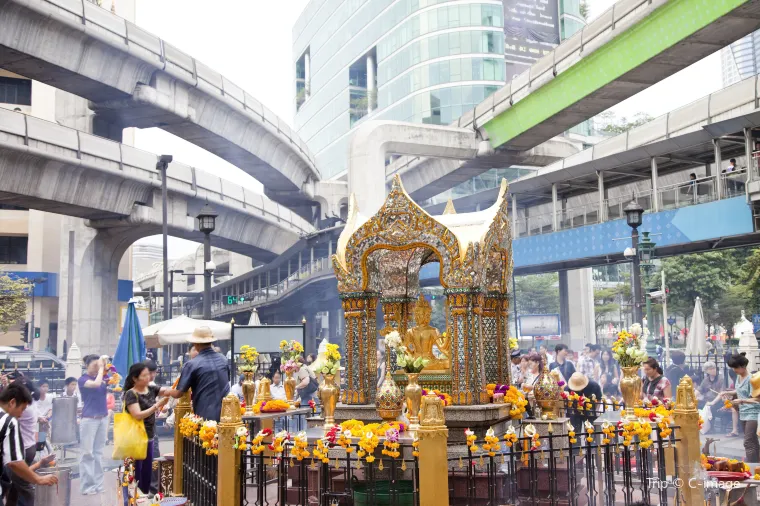
The processing time for an Indonesia visa varies depending on the type of visa being applied for. Below are the typical processing times for common visa types:
1. Tourist Visa (Single Entry)
- Processing Time: Typically 5–10 working days
- Details: This timeframe applies when all required documents are submitted correctly. Delays may occur if additional information is needed or during peak travel seasons.
2. Multiple-Entry Tourist Visa
- Processing Time: Generally, 5–10 working days
- Details: Similar to the single-entry tourist visa but may take longer depending on the embassy's workload.
3. Non-Immigrant Visas (e.g., Business, Education, Retirement)
- Processing Time: Approximately 5–10 working days
- Details: Processing times can vary based on the specific visa category and the embassy's requirements.
4. e-Visa (Electronic Visa)
- Processing Time: Typically 2–3 business days, but can extend up to 10 working days
- Details: Processing times may vary depending on the applicant's nationality and the type of visa. It's advisable to apply at least 15 working days before your intended travel date.
5. Destination Thailand Visa (DTV)
- Processing Time: May take longer than 7 working days
- Details: Applicants may be required to appear in person at the embassy for an interview, which can extend processing times.


 86394 booked
86394 booked